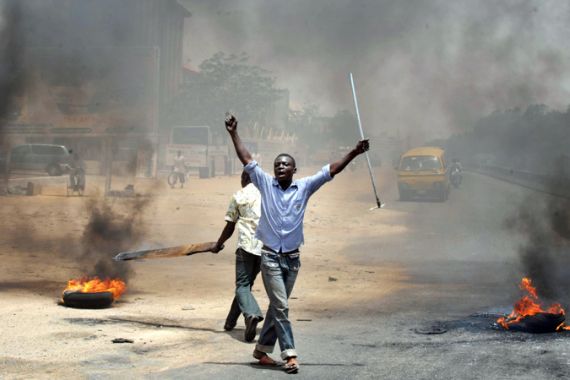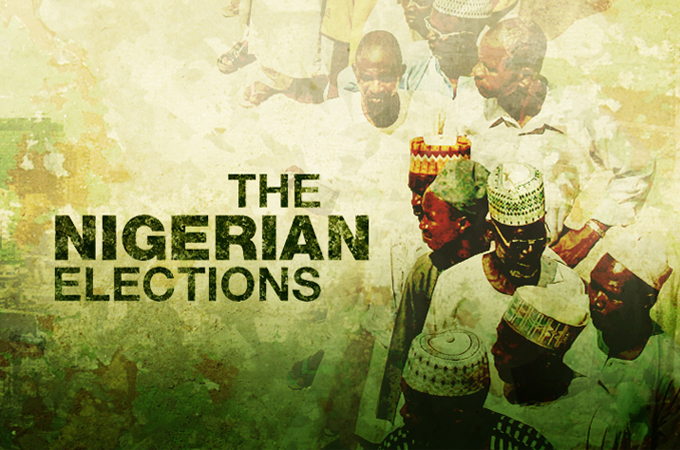Nigerian president urges calm after poll
Sweeping victory for incumbent Goodluck Jonathan sparks unrest in opposition strongholds amid vote-rigging allegations.

Goodluck Jonathan, the Nigerian president, has urged an end to “sporadic unrest” after deadly riots erupted in the country’s north following results showing him winning elections.
Results from all 36 states plus the capital Abuja show that Jonathan has more than 22 million votes, or almost 59 per cent while his main challenger, ex-military ruler Muhammadu Buhari, has about 12 million (32 per cent).
Nuhu Ribadu, the country’s former anti-corruption czar who was also in the presidential race representing his Action Congress of Nigeria (ACN) party, won just 5.4 per cent of the vote.
Jonathan, a politician from the mainly Christian south, has also received more than 25 per cent in at least two-thirds of the states – a requirement to avoid a run-off.
“I have received with great sadness the news of sporadic unrest in some parts of the country which are not unconnected with last Saturday’s elections,” a statement from Jonathan’s office said on Monday.
“I appeal to those involved to stop this unnecessary and avoidable conduct, more so at this point in time when a lot of sacrifice has been made by all the citizens of this great country in ensuring the conduct of free and fair elections.”
And he called on “all our political leaders, especially the contestants, to appeal to their supporters to stop further violence in the interest of stability, peace and well-being of this great country”.
In a statement issued late on Monday night, Attahiru Jega, the chairman of the Independent National Electoral Commission, said election organisers had “discharged our responsibility to the best of our ability on a nonpartisan, impartial basis and we have done our best to satisfy the aspirations of Nigerians for free, fair and credible elections.”
The electoral commission chief has not yet officially declared Jonathan, of the ruling People’s Democratic Party (PDP), the winner.
Rioting in multiple states
Earlier, rioting erupted in several towns in Nigeria’s predominantly Muslim north amid allegations of vote-rigging and results showing sharp divisions between the north and the south.
Protesting youths challenged soldiers deployed to the streets of Nigeria’s second-largest city of Kano, and troops sought to push them back, an AFP correspondent said.
Several incidents of violence have been reported, including a church being burned down in the state of Kaduna.
Protesters stopped cars and demanded that passengers express support for Buhari, whose stronghold is in the north.
A police spokesman said security had been deployed to the city of Sokoto to contain youths burning bonfires in protest over the vote.
“Their grievance is this: that this election has been rigged,” said Al Jazeera correspondent Yvonne Ndege. “They don’t believe the results that have been announced by the country’s independent national electoral commission.”
Buhari, of the Congress for Progressive Change (CPC), told Al Jazeera that the poll had been systemically rigged.
“We have evidence in our hands that the computers [used in the voting process], were programmed to produce rigged results.”
‘Orderly and calm’
John Kufuor, a former president of Ghana and the lead observer from the African Union, told Al Jazeera that he was “taken aback” by reports of the violence, as he and his team had only observed “orderly and calm” scenes.
“From what we observed, elections have go on, so far, credibly, peacefully and transparently,” said Kufuor.
 The election, generally seen as peaceful and fairer compared to past elections in 2003 and 2007, has been described by some observers as the cleanest for head of state in nearly two decades.
The election, generally seen as peaceful and fairer compared to past elections in 2003 and 2007, has been described by some observers as the cleanest for head of state in nearly two decades.
Concerns were raised late on Sunday over extraordinarily high totals favouring Jonathan in parts of his native south.
“Figures of 95 per cent and above for one party suggest that these are fabricated figures and, personally, they worry me because they pose serious questions on the credibility of the election,” said Jibrin Ibrahim of the Centre for Democracy and Development.
The PDP, which has won presidential elections since 1999 when Nigeria returned to civilian rule, was widely expected to win as the opposition appeared to command support in less than 15 states.
Jonathan, 53, is the first president from the main oil-producing Niger Delta region. He occupied the post after the death of the country’s elected Muslim leader.
Many of the north’s elite wanted the ruling party to honour an unwritten power-sharing agreement – known as “zoning” – calling for a Muslim candidate to run in this election, yet Jonathan prevailed in the party’s primary.